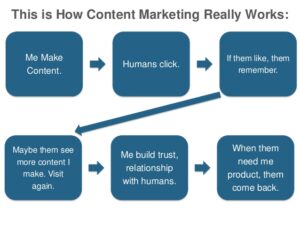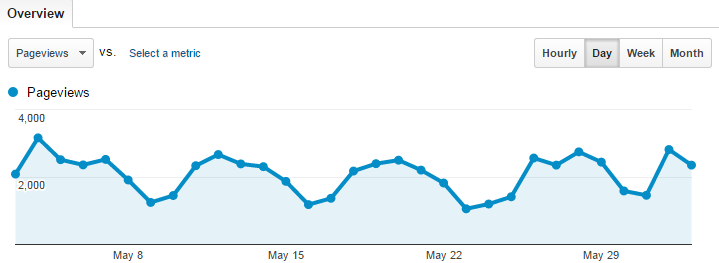-
 5 min. read
5 min. read
-
 Trevin Shirey
Trevin Shirey VP of Marketing
VP of Marketing
- Trevin serves as the VP of Marketing at WebFX. He has worked on over 450 marketing campaigns and has been building websites for over 25 years. His work has been featured by Search Engine Land, USA Today, Fast Company and Inc.
Today, the majority of business owners understand that Internet marketing is absolutely necessary to grow their company. They realize that their target audience is spending more and more time online, and that the best way to reach them is to be there as well. Unfortunately, the responsibility for this task typically falls to one of two people: A marketing manager with years of experience in traditional methods, or the business owner themselves.
In either case, it’s difficult to do, and almost impossible to do well. Internet marketing is an entirely separate process from traditional marketing, and it requires a very different set of skills. So before you set out to create Internet marketing strategy or hire an agency to do the job, here are five things you need to know:
1. SEO is more than what’s on your website
When you think of search engine optimization, or SEO, you probably think of incorporating relevant keywords throughout your site. And while that’s certainly an important step, it’s not the only one to consider.  Beyond on-page elements, a comprehensive SEO strategy also involves working on other factors like links to your site, social signals, and reviews.
Beyond on-page elements, a comprehensive SEO strategy also involves working on other factors like links to your site, social signals, and reviews.
The most important of these is links from high-quality and authoritative sites. Search engines see these links as votes of confidence in your site, and the more you have from reputable sites, the more authority you gain. And because search engines want to deliver the best possible results to users, high-authority sites rank higher in search results.
However, the process of getting them, called link building, can be more difficult than it sounds. Thanks to “black hat” SEOs and spammers, many site owners are hesitant to link to other sites. You’ll have to make something great to earn honest links to your site, and put time and energy into building relationships both online.
And no matter what you do, never attempt to pay site owners for links.
2. Results take time
Think about what happens when you take out an ad in the local paper. You write the copy, find a photo or two, and send it to the paper’s advertising department. By the end of the week your ad is delivered directly to the homes of a few hundreds or thousands of readers.
If you’re accustomed to this kind of quick turnaround, it may come as an unpleasant surprise that many Internet marketing is different. Some strategies take weeks – if not months – to show results. That being said, when your efforts begin to pay off, the results are much longer-lasting than what you get with paid ad space.
Going back to the newspaper example, think about what happens after the set amount of time you paid to run your ad. Either you pay the paper to print it for a few more days, or it simply stops altogether. With tactics like SEO and content marketing, that’s not the case.
Once you’ve built up your online reputation and earned a top spot in search engine results, you can hold onto it for weeks, months, or even years.
3. Selling is a process
In the ideal scenario, potential customers would perform a Google search for your industry, find your site, and make a purchase within minutes. However, the vast majority of sales do not follow this process. Instead, they involve many visits to both you and your competitors’ sites, outside research, and other channels like email and social media.
 This SlideShare by Rand Fishkin includes a fun, caveman-style take on this difference between our expectations and what actually happens. It boils down to this: Even with the power of the Internet, you can’t just create one great landing page or piece of content and expect that it will immediately generate a ton of leads. You still have to understand your target audience and their needs, then create content for all stages of the sales funnel.
This SlideShare by Rand Fishkin includes a fun, caveman-style take on this difference between our expectations and what actually happens. It boils down to this: Even with the power of the Internet, you can’t just create one great landing page or piece of content and expect that it will immediately generate a ton of leads. You still have to understand your target audience and their needs, then create content for all stages of the sales funnel.
Then, you’ll have a much higher chance of turning site visitors into paying customers.
4. Traffic is not the most important metric
In a basic definition, Internet marketing is designed to improve your online visibility and bring visitors to your site. But here’s the thing: How much money do you make from someone simply landing on your homepage? Unless your business earns its revenue by selling display ad space, the answer is none.
 That’s why traffic is not the most important metric when it comes to measuring online marketing success. Instead, you should focus on your site’s ability to turn visitors into leads, also known as your conversion rate. If you’re still not convinced that traffic isn’t the ultimate indicator of success, check out this blog post discussing a few other traffic myths. Then, check out these 25 tips for increasing your conversion rate.
That’s why traffic is not the most important metric when it comes to measuring online marketing success. Instead, you should focus on your site’s ability to turn visitors into leads, also known as your conversion rate. If you’re still not convinced that traffic isn’t the ultimate indicator of success, check out this blog post discussing a few other traffic myths. Then, check out these 25 tips for increasing your conversion rate.
These resources will give you a great starting point for running a successful SEO campaign.
5. It changes all the time
Finally, it’s important to note that Internet marketing is a constantly-changing industry. Algorithms change, best practices shift, and search engine results pages become increasingly competitive, meaning that what works today may not work a month from now. If you want to succeed online, you essentially have two options: Set aside time each week to keeping your strategy current, or hire an Internet marketing specialist.
Any questions?
As with any industry, it would be impossible to explain everything you need to understand about Internet marketing in one blog post.
If you have any questions about these five points – or anything else you want to know about marketing a business online – please let me know in the comments below!
-
 Trevin serves as the VP of Marketing at WebFX. He has worked on over 450 marketing campaigns and has been building websites for over 25 years. His work has been featured by Search Engine Land, USA Today, Fast Company and Inc.
Trevin serves as the VP of Marketing at WebFX. He has worked on over 450 marketing campaigns and has been building websites for over 25 years. His work has been featured by Search Engine Land, USA Today, Fast Company and Inc. -

WebFX is a full-service marketing agency with 1,100+ client reviews and a 4.9-star rating on Clutch! Find out how our expert team and revenue-accelerating tech can drive results for you! Learn more
Try our free Marketing Calculator
Craft a tailored online marketing strategy! Utilize our free Internet marketing calculator for a custom plan based on your location, reach, timeframe, and budget.
Plan Your Marketing Budget

Maximize Your Marketing ROI
Claim your free eBook packed with proven strategies to boost your marketing efforts.
Get the GuideTry our free Marketing Calculator
Craft a tailored online marketing strategy! Utilize our free Internet marketing calculator for a custom plan based on your location, reach, timeframe, and budget.
Plan Your Marketing Budget





